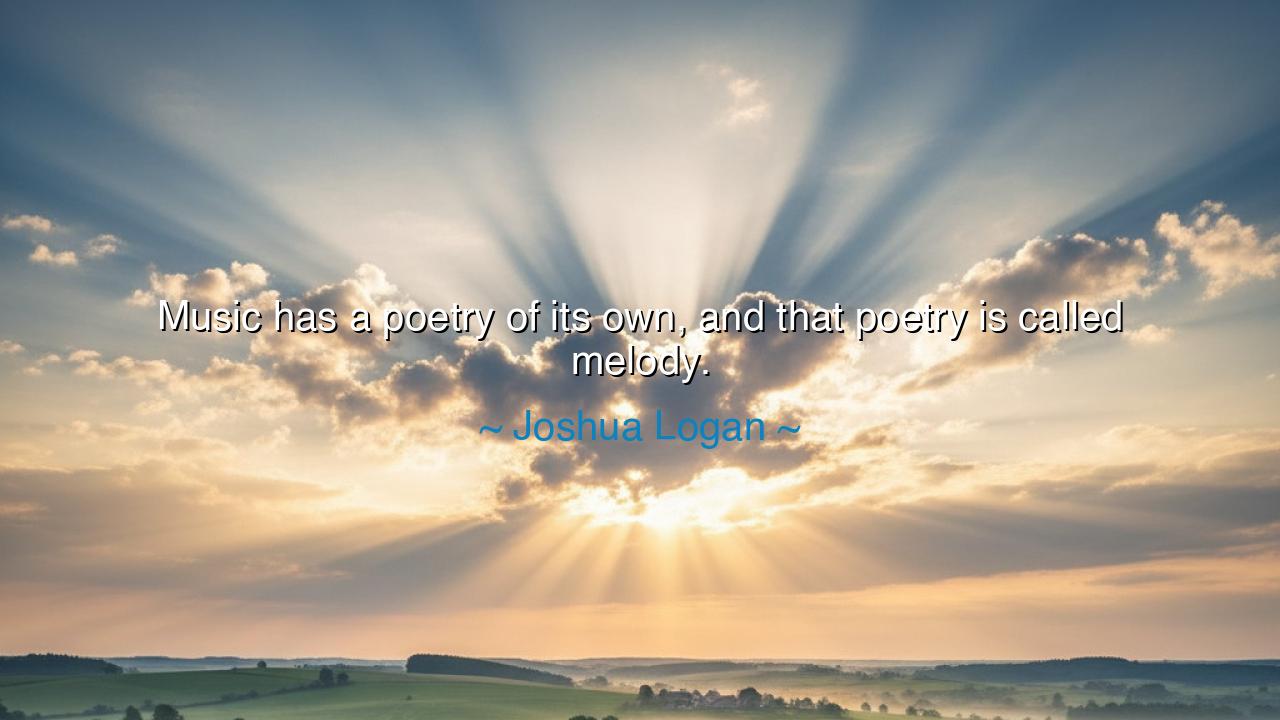
Music has a poetry of its own, and that poetry is called melody.






“Music has a poetry of its own, and that poetry is called melody.” Thus spoke Joshua Logan, the master of stage and screen, whose works sought not only to entertain but to stir the human soul. His words shine like a lamp upon a hidden truth: that just as verse and rhyme give form to language, so too does melody give form to music. Without it, sound is but noise scattered in the air. With it, music becomes speech beyond words, a poetry that needs no tongue yet pierces deeper than any sentence ever written.
The ancients knew this well. Long before paper bore poems, men raised their voices in chant, in hymn, in song. The rhythm of drums gave them strength in battle, but it was melody that gave them memory, binding stories and prayers into lines that lived from one generation to the next. This was their poetry, written not with ink upon scrolls, but with notes upon the wind. Melody was the bridge between the mortal and the divine, a poetry of sound that lingered long after the words themselves were forgotten.
Consider the tale of Orpheus, the legendary musician of Greece. It was not the cleverness of his speech that charmed the trees and the stones, nor the rhetoric of poets that softened the hearts of gods. It was his melody, the poetry of his music, that carried such power that even Hades bent beneath it. Orpheus teaches us that melody is a force deeper than reason, a poetry that moves both the seen and the unseen, the living and the dead.
In more recent times, think of Ludwig van Beethoven. Deaf, cut off from the sound of voices and the world’s chatter, he yet composed symphonies that still thunder across centuries. His words were silent, but his melody spoke louder than any poet’s verse. The poetry of music that poured from his soul is remembered even now, teaching us that melody itself is the truest poetry—one that neither silence nor time can destroy.
The lesson is clear: do not believe that only words carry meaning, or that only speech can stir hearts. The poetry of music reminds us that the human soul hungers not only for reason, but for beauty, for harmony, for the song that lingers when all arguments fade. To hear a melody is to be reminded of the deeper language, the language of the heart, which speaks without syllables yet is understood by all.
O seekers of wisdom, let this truth guide you: honor the melodies in your life, not only in music but in every rhythm of existence. For there is melody in the laughter of a child, in the rising and falling of the ocean tide, in the gentle cadence of friendship and love. To live with awareness is to hear the poetry that surrounds you at every moment.
In practice, seek out melodies that strengthen your spirit. Sing aloud, even if no one listens. Listen deeply to music not as background noise, but as a sacred poetry written in sound. And when you create, whether in art, in work, or in the shaping of your own life, remember that what endures is not the noise of busyness, but the melody that gives it form and meaning.
Thus let Joshua Logan’s words endure: “Music has a poetry of its own, and that poetry is called melody.” Cherish melody, for it is the invisible ink that writes upon the soul. It is the poetry that unites us all, across languages and across time, reminding us that beauty is not only spoken—it is sung.






AAdministratorAdministrator
Welcome, honored guests. Please leave a comment, we will respond soon